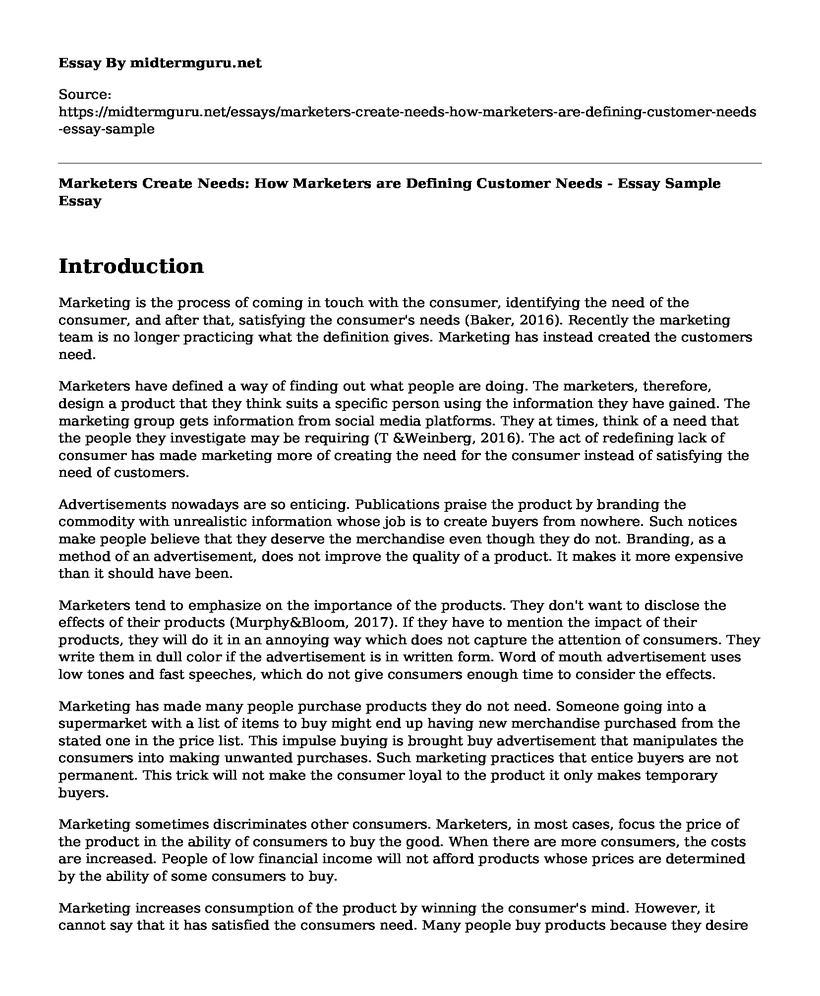Introduction
Marketing is the process of coming in touch with the consumer, identifying the need of the consumer, and after that, satisfying the consumer's needs (Baker, 2016). Recently the marketing team is no longer practicing what the definition gives. Marketing has instead created the customers need.
Marketers have defined a way of finding out what people are doing. The marketers, therefore, design a product that they think suits a specific person using the information they have gained. The marketing group gets information from social media platforms. They at times, think of a need that the people they investigate may be requiring (T &Weinberg, 2016). The act of redefining lack of consumer has made marketing more of creating the need for the consumer instead of satisfying the need of customers.
Advertisements nowadays are so enticing. Publications praise the product by branding the commodity with unrealistic information whose job is to create buyers from nowhere. Such notices make people believe that they deserve the merchandise even though they do not. Branding, as a method of an advertisement, does not improve the quality of a product. It makes it more expensive than it should have been.
Marketers tend to emphasize on the importance of the products. They don't want to disclose the effects of their products (Murphy&Bloom, 2017). If they have to mention the impact of their products, they will do it in an annoying way which does not capture the attention of consumers. They write them in dull color if the advertisement is in written form. Word of mouth advertisement uses low tones and fast speeches, which do not give consumers enough time to consider the effects.
Marketing has made many people purchase products they do not need. Someone going into a supermarket with a list of items to buy might end up having new merchandise purchased from the stated one in the price list. This impulse buying is brought buy advertisement that manipulates the consumers into making unwanted purchases. Such marketing practices that entice buyers are not permanent. This trick will not make the consumer loyal to the product it only makes temporary buyers.
Marketing sometimes discriminates other consumers. Marketers, in most cases, focus the price of the product in the ability of consumers to buy the good. When there are more consumers, the costs are increased. People of low financial income will not afford products whose prices are determined by the ability of some consumers to buy.
Marketing increases consumption of the product by winning the consumer's mind. However, it cannot say that it has satisfied the consumers need. Many people buy products because they desire what the marketer is speaking about a commodity but not what they need. People end up buying products frequently rather than rarely but satisfying.
Conclusion
In conclusion, marketing has a lot of social, economic, and biological effects on people. Marketing no longer serves the consumer with the sense of satisfying the consumer-defined need; relatively, marketing creates the requirements to the consumer that suits their products. Marketers don't want to discover the consumers' needs and respond with suitable products. Marketing is criticized by many; most of the critics are justified. The above-cited instances are a few of the cases that marketing has gone wrong. Managers need to be responsible and find a way of responding to the needs of consumers with the right commodity, price, and value.
References
Baker, M. J. (2016). What is marketing?. The Marketing Book (pp. 25-42). Routledge Dhar. Retrieved from https://books.google.com/books?hl=en&lr=&id=wTT7CwAAQBAJ&oi=fnd&pg=PP1&dq=Baker,+M.+J.+(2016).+What+is+marketing%3F.+The+Marketing+Book+(pp.+25-42).+Routledge.Dhar,&ots=N0hcGRWTRN&sig=sd702ZTYD5paolcQZqiVrPPTKH0
T. & Weinberg, C. B. (2016). Measurement of interactions in non-linear marketing models: The effect of critics' ratings and consumer sentiment on movie demand. International Journal of research in Marketing, 33(2), 392-408. Retrieved from https://www.sciencedirect.com/science/article/pii/S0167811615001196
Murphy, P. E., & Bloom, P. N. (2017). Ethical issues in social marketing. In Marketing the public sector (pp. 68-78). Routledge.
Cite this page
Marketers Create Needs: How Marketers are Defining Customer Needs - Essay Sample. (2023, Feb 04). Retrieved from https://midtermguru.com/essays/marketers-create-needs-how-marketers-are-defining-customer-needs-essay-sample
If you are the original author of this essay and no longer wish to have it published on the midtermguru.com website, please click below to request its removal:
- Oliver Cabells Company Analysis - Paper Example
- General Discussion of Consumer Behaviour - Paper Example
- Paper Example on Ethics, Stakeholders and the Individual Thinking
- European & American Companies' Supplier Selection: Impact on Business Performance - Essay Sample
- Empowering Managers to Create Teamwork and Goodwill in an Organization - Essay Sample
- Boosting Student Enrollment at Murray State University - Research Paper
- Johnson & Johnson Crisis: Solutions and Implementation Plan - Essay Sample







